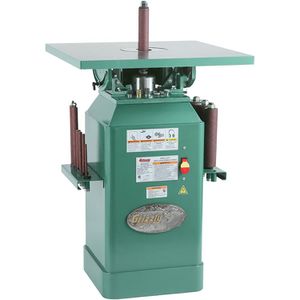Difference between revisions of "Oscillating Spindle Sander"
| (40 intermediate revisions by 6 users not shown) | |||
| Line 4: | Line 4: | ||
|Is used in domain=Wood | |Is used in domain=Wood | ||
|Has name={{PAGENAME}} | |Has name={{PAGENAME}} | ||
| + | |Has make=Grizzly Industrial | ||
| + | |Has model=G1071 | ||
| + | |Has serial number=1709690 | ||
| + | |Has life expectancy= | ||
| + | |Has year of manufacture or purchase= | ||
| + | |Has replacement cost= | ||
|Has icon=File:Spindle Sander.png | |Has icon=File:Spindle Sander.png | ||
|Has icondesc= | |Has icondesc= | ||
| Line 10: | Line 16: | ||
|Has imagedesc=Oscillating Spindle Sander | |Has imagedesc=Oscillating Spindle Sander | ||
|Has description= | |Has description= | ||
| − | |Has certification= | + | |Has certification=https://georgefox.instructure.com/courses/1204 |
| − | + | |Has ace=Needed;gdowler@georgefox.edu | |
| − | |||
| − | |Has ace= | ||
}} | }} | ||
| − | [[{{#show: {{FULLPAGENAME}}|?Has icon|link=none}}| | + | [[{{#show: {{FULLPAGENAME}}|?Has icon|link=none}}|140px|left|top|{{#show: {{FULLPAGENAME}}|?Has icondesc}}]] |
[[{{#show: {{FULLPAGENAME}}|?Has image|link=none}}|300px|thumb|upright=1.5|{{#show: {{FULLPAGENAME}}|?Has imagedesc}}]] | [[{{#show: {{FULLPAGENAME}}|?Has image|link=none}}|300px|thumb|upright=1.5|{{#show: {{FULLPAGENAME}}|?Has imagedesc}}]] | ||
| Line 21: | Line 25: | ||
Model: {{#show: {{PAGENAME}} |?Has model}} | Model: {{#show: {{PAGENAME}} |?Has model}} | ||
| + | |||
| + | Serial Number: {{#show: {{PAGENAME}} |?Has serial number}} | ||
Ace: {{#show: {{PAGENAME}} |?Has ace.Has name}} ({{#show: {{PAGENAME}} |?Has ace.Has email address}}). | Ace: {{#show: {{PAGENAME}} |?Has ace.Has name}} ({{#show: {{PAGENAME}} |?Has ace.Has email address}}). | ||
Location: {{#show: {{PAGENAME}} |?Is located in facility}} | Location: {{#show: {{PAGENAME}} |?Is located in facility}} | ||
| + | |||
| + | |||
__TOC__ | __TOC__ | ||
| + | |||
| + | ==Safety First== | ||
| + | [[File:Safety First HD2.png|left|150px]] | ||
| + | There are several hazards you need to be aware of when using a spindle sander. | ||
| + | * Never make contact with the rotating spindle. The sand paper is very aggressive and could cause serious injury. | ||
| + | * The spindle is rotating at a high rate of speed and can grab your work piece. | ||
| + | * Hold onto material firmly and keep it against the table. This will help prevent the material from getting pulled out of your hands. If material catches on the spindle it can starts rotating quickly and create a dangerous situation. | ||
| + | |||
| + | |||
| + | |||
==Description== | ==Description== | ||
| − | + | The Grizzly vertical spindle sander is for sanding curved surfaces square to the table. The machine contains a 1HP motor and has 10 different sanding spindles ranging from 1/4" to 4" in diameter. The cast iron table has an opening that provides clearance for the spindles to oscillate up and down. The oscillating action will give you a smooth sanded surface at 1725 RPM. The 4" dust port connects easily to any dust collector. | |
| + | |||
| + | |||
Here is an example of this piece of equipment being used. | Here is an example of this piece of equipment being used. | ||
| − | + | {{#evu:https://www.youtube.com/watch?v=Exi3raTmaNQ}} | |
| − | |||
==Documentation== | ==Documentation== | ||
| Line 39: | Line 58: | ||
====Terminology==== | ====Terminology==== | ||
| − | Insert | + | *'''Table Insert-''' A metal plate that covers the opening between the spindle and table. |
| + | *'''Sanding Spindle-''' A metal shaft with a rubber section that supports a sand paper sleeve. These come in a variety of sizes. | ||
| − | User Manual | + | [[Media:G1071_m.pdf|Oscillating Spindle Sander User Manual]] |
==Training== | ==Training== | ||
| − | ==== | + | ====Operation==== |
| − | + | The spindle sander is normally used for sanding inside corners. There are various spindles that range from 1/4" to 4". If you need to change out the spindle ask the supervisor on shift for assistance. Make sure the spindle taper is clean before installing a new spindle. Only hand tighten the spindles during installation so they can be removed. The spindle also oscillates up and down as it rotates to produce a smooth finish. The machine has an on/off power switch located on the control panel. Make sure the material you are cutting is free of all foreign objects. Do not sand materials that may have nails or screws as they will damage the drum and may cause injury to you. Also, if the material contains a loose knot it can break free and create a safety hazard. Do not sand plastics, rubber, metal or any other materials other than natural woods. | |
| + | |||
| + | If your material looks good, the next step is to make sure you have the appropriate spindle installed. You will also want to hook up the adjacent dust collector to the rear of the machine, make sure it is plugged in, and turned on. The dust collector must be used with the sander to help keep the dust out of the air. As you sand, it is imperative that you keep the material firmly against the table and gently push the material into the spindle to make the surface perpendicular to the table. Hold firmly onto the material as it could get pulled out of your hands. If you are sanding the inside of a circle and the material pulls out of your hands do not attempt to grab the spinning part. If you can safely reach the power switch shut off the machine and wait for the part to stop moving. | ||
| + | |||
| + | After the sander is set up you are ready to work. Turn on the sander and gently push the material into the drum, making sure to keep your hands a safe distance from the spindle. Do not force material into the drum. | ||
====Demonstration==== | ====Demonstration==== | ||
| − | + | Demonstrate you can safely setup the spindle sander and create a smooth radius. Remember to use the appropriate drum size. You will need to draw a guide line to follow. | |
====General Procedure==== | ====General Procedure==== | ||
| − | + | '''Inside Radius''' | |
| − | + | 1. Ensure that the material you are sanding is at least 4" long and no nails or foreign objects. | |
| − | + | ||
| + | 2. Sketch a radius onto your material using pencil. | ||
| + | |||
| + | 3. Make sure the spindle in the machine fits the radius you have drawn. If the spindle needs to be changed ask the supervisor on shift for help. | ||
| + | |||
| + | 4. Connect the dust collector to the port on the back of the machine. | ||
| + | |||
| + | 5. Turn on the power switch on the front of the sander and the dust collector. Make sure nothing is making contact with sanding drum. | ||
| + | |||
| + | 7. Gently feed the material into the sanding drum while firmly holding onto the material. Keep your fingers away from the spinning drum. | ||
| + | |||
| + | 8. Carefully remove material as you keep an eye on the reference line. Slowly remove material up to the line. | ||
| + | |||
| + | 9. When all of the material has been removed take the work piece off the table. | ||
| + | |||
| + | 10. Turn off the power switch for the sander and the dust collector. | ||
| + | |||
| + | 11. Make sure to reset the space. | ||
==Certification== | ==Certification== | ||
| − | + | [https://georgefox.instructure.com/courses/1204 Canvas Quiz] | |
==Troubleshooting== | ==Troubleshooting== | ||
| Line 68: | Line 109: | ||
====General maintenance==== | ====General maintenance==== | ||
| − | + | *As sanding sleeves are used they will "gum up" with saw dust. If not removed, the saw dust will harden and reduce the life of the sanding sleeve. As needed, a abrasive cleaner should be used on the sleeves. | |
| + | *The taper end of the sanding spindles should be lubricated with a light oil. | ||
====Specific Maintenance Tasks==== | ====Specific Maintenance Tasks==== | ||
| Line 80: | Line 122: | ||
|Sample | |Sample | ||
|} | |} | ||
| − | |||
| − | |||
| − | |||
| − | |||
| − | |||
| − | |||
| − | |||
Revision as of 12:43, 23 January 2023
Make: Grizzly Industrial
Model: G1071
Serial Number: 1709690
Ace: Needed (gdowler@georgefox.edu).
Location: Wood Shop
Safety First
There are several hazards you need to be aware of when using a spindle sander.
- Never make contact with the rotating spindle. The sand paper is very aggressive and could cause serious injury.
- The spindle is rotating at a high rate of speed and can grab your work piece.
- Hold onto material firmly and keep it against the table. This will help prevent the material from getting pulled out of your hands. If material catches on the spindle it can starts rotating quickly and create a dangerous situation.
Description
The Grizzly vertical spindle sander is for sanding curved surfaces square to the table. The machine contains a 1HP motor and has 10 different sanding spindles ranging from 1/4" to 4" in diameter. The cast iron table has an opening that provides clearance for the spindles to oscillate up and down. The oscillating action will give you a smooth sanded surface at 1725 RPM. The 4" dust port connects easily to any dust collector.
Here is an example of this piece of equipment being used.
Documentation
Terminology
- Table Insert- A metal plate that covers the opening between the spindle and table.
- Sanding Spindle- A metal shaft with a rubber section that supports a sand paper sleeve. These come in a variety of sizes.
Oscillating Spindle Sander User Manual
Training
Operation
The spindle sander is normally used for sanding inside corners. There are various spindles that range from 1/4" to 4". If you need to change out the spindle ask the supervisor on shift for assistance. Make sure the spindle taper is clean before installing a new spindle. Only hand tighten the spindles during installation so they can be removed. The spindle also oscillates up and down as it rotates to produce a smooth finish. The machine has an on/off power switch located on the control panel. Make sure the material you are cutting is free of all foreign objects. Do not sand materials that may have nails or screws as they will damage the drum and may cause injury to you. Also, if the material contains a loose knot it can break free and create a safety hazard. Do not sand plastics, rubber, metal or any other materials other than natural woods.
If your material looks good, the next step is to make sure you have the appropriate spindle installed. You will also want to hook up the adjacent dust collector to the rear of the machine, make sure it is plugged in, and turned on. The dust collector must be used with the sander to help keep the dust out of the air. As you sand, it is imperative that you keep the material firmly against the table and gently push the material into the spindle to make the surface perpendicular to the table. Hold firmly onto the material as it could get pulled out of your hands. If you are sanding the inside of a circle and the material pulls out of your hands do not attempt to grab the spinning part. If you can safely reach the power switch shut off the machine and wait for the part to stop moving.
After the sander is set up you are ready to work. Turn on the sander and gently push the material into the drum, making sure to keep your hands a safe distance from the spindle. Do not force material into the drum.
Demonstration
Demonstrate you can safely setup the spindle sander and create a smooth radius. Remember to use the appropriate drum size. You will need to draw a guide line to follow.
General Procedure
Inside Radius
1. Ensure that the material you are sanding is at least 4" long and no nails or foreign objects.
2. Sketch a radius onto your material using pencil.
3. Make sure the spindle in the machine fits the radius you have drawn. If the spindle needs to be changed ask the supervisor on shift for help.
4. Connect the dust collector to the port on the back of the machine.
5. Turn on the power switch on the front of the sander and the dust collector. Make sure nothing is making contact with sanding drum.
7. Gently feed the material into the sanding drum while firmly holding onto the material. Keep your fingers away from the spinning drum.
8. Carefully remove material as you keep an eye on the reference line. Slowly remove material up to the line.
9. When all of the material has been removed take the work piece off the table.
10. Turn off the power switch for the sander and the dust collector.
11. Make sure to reset the space.
Certification
Troubleshooting
Maintenance
General maintenance
- As sanding sleeves are used they will "gum up" with saw dust. If not removed, the saw dust will harden and reduce the life of the sanding sleeve. As needed, a abrasive cleaner should be used on the sleeves.
- The taper end of the sanding spindles should be lubricated with a light oil.
Specific Maintenance Tasks
| Maintenance Procedure | Frequency | Done By |
|---|---|---|
| Sample | Sample | Sample |


